Winter is coming: How forward-thinking funeral homes are preparing for the Internet Generation.
Four years ago, my cofounder Tyler’s grandmother passed away. Tasked with the responsibility of planning a funeral in his late twenties, he was lost. Tyler did what anyone who grew up with the Internet would do: he used it to solve his new problem. He tried to find a funeral home online.
He expected the transparency and convenience he’d grown accustomed to in all aspects of his life. It shocked and confused him this wasn’t the case with the funeral industry. He couldn’t make a confident funeral decision online. What should have taken him a few hours ended up taking him a week. That’s when we started Parting to help the Internet Generation navigate the funeral industry.
Over the last three years, we’ve partnered with forward-thinking funeral homes and helped them adapt to the changes they’re seeing in the market. We’ve found customers online for thousands of funeral homes with Parting.com. Hundreds are using Parting Pro, our case management software, to convert price shoppers and sell cremations online. Immersed in the industry, we discovered a larger purpose. We’re preparing our funeral home partners for the impending onslaught of the Internet Generation.
Your funeral home should also see the paradigm shift on the horizon. Transforming the way you do business is necessary for survival. Start preparing. You’ll dominate your competition when the Internet Generation changes everything.
The Internet Generation is coming.
When Match.com first launched in 1995, users met by exchanging messages and photos via e-mail. Within six months, 100,000 young singles registered to meet strangers on the Internet. Still stigmatized by society as “desperate,” by 2006 16 million young Americans had met a stranger on a dating website. Today, it is a social norm, with 40 million Americans currently using online dating apps to meet an online stranger.
If you follow the lives of our young online daters from 2006, you’ll find a wake of destruction. When the Internet Generation faces a life problem, they use the Internet to solve it. Whether it’s planning a wedding, buying a house, or having kids. Every industry they’ve touched has been completely disrupted. Businesses who’ve embraced the radical shift in consumer behavior have done well. Those who weren’t able to adapt are no longer around.
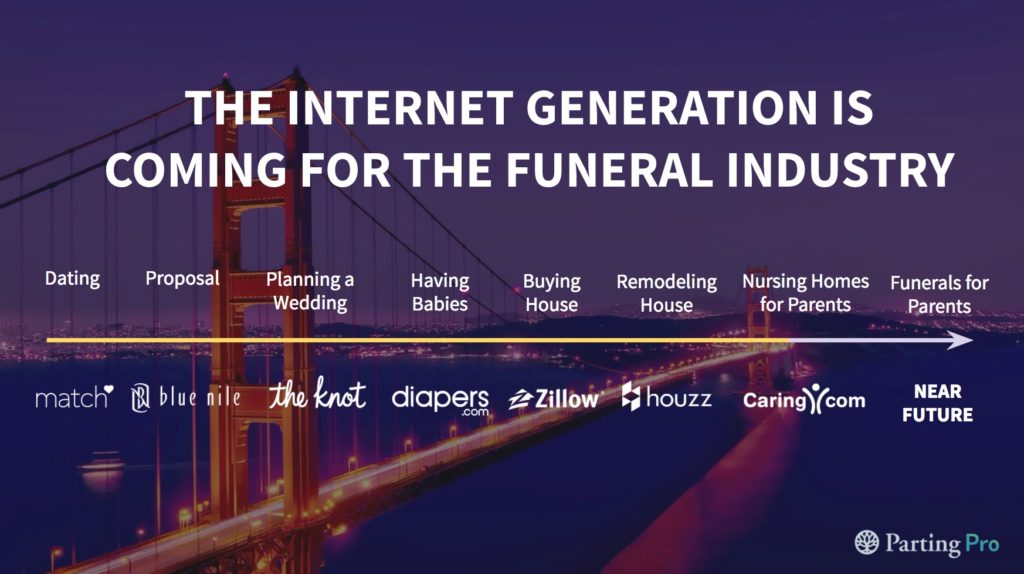
Today, our innovative online daters are now in their 30’s and 40’s. They’re worrying about finding caretakers for their aging parents and grandparents. Consumer preferences of the Internet Generation are now transforming the elderly care industry. Tomorrow, it’ll be the funeral industry.
Neither RedBox nor Netflix are even on the radar screen in terms of competition.
— Blockbuster CEO, 2008
The Shift to “Virtual” Real Estate.
How the Internet Generation will change where you market your funeral home.
Real estate was a crucial factor of the successful traditional retail model. A prime location in the community was critical for traditional funeral homes. Potential customers would drive by everyday and would remember where to go if they suddenly had a need. Physical billboards accomplished the same. Strong relationships within the community were the foundation of their businesses. Without additional information, potential customers had to trust word-of-mouth referrals from local churches and hospices.
How and where you get your new customers is the first aspect that needs to change. Real estate is still critical but physical locations are not as relevant. Establishing prime virtual locations is the key to beating the competition.
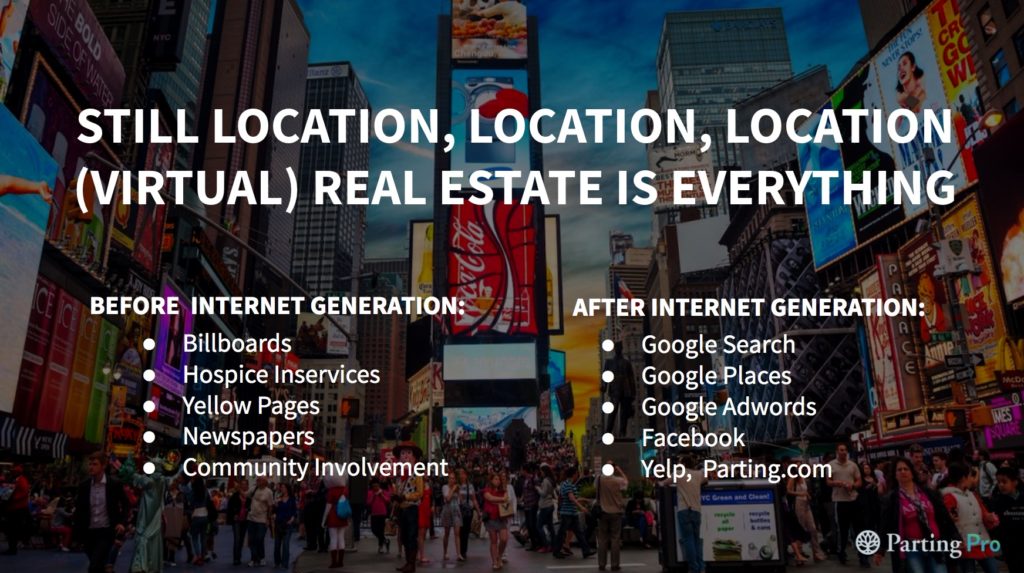
You’re already seeing indications of the oncoming change. You’ve built your website. You’re paying for Google Ads. You’re investing in Yelp. Congratulations on taking the first steps in adapting to the Internet Generation. It’s important to stay ahead of the curve and continue on this path. The goal is to be the first funeral home a potential customer sees anytime and anywhere they look online.
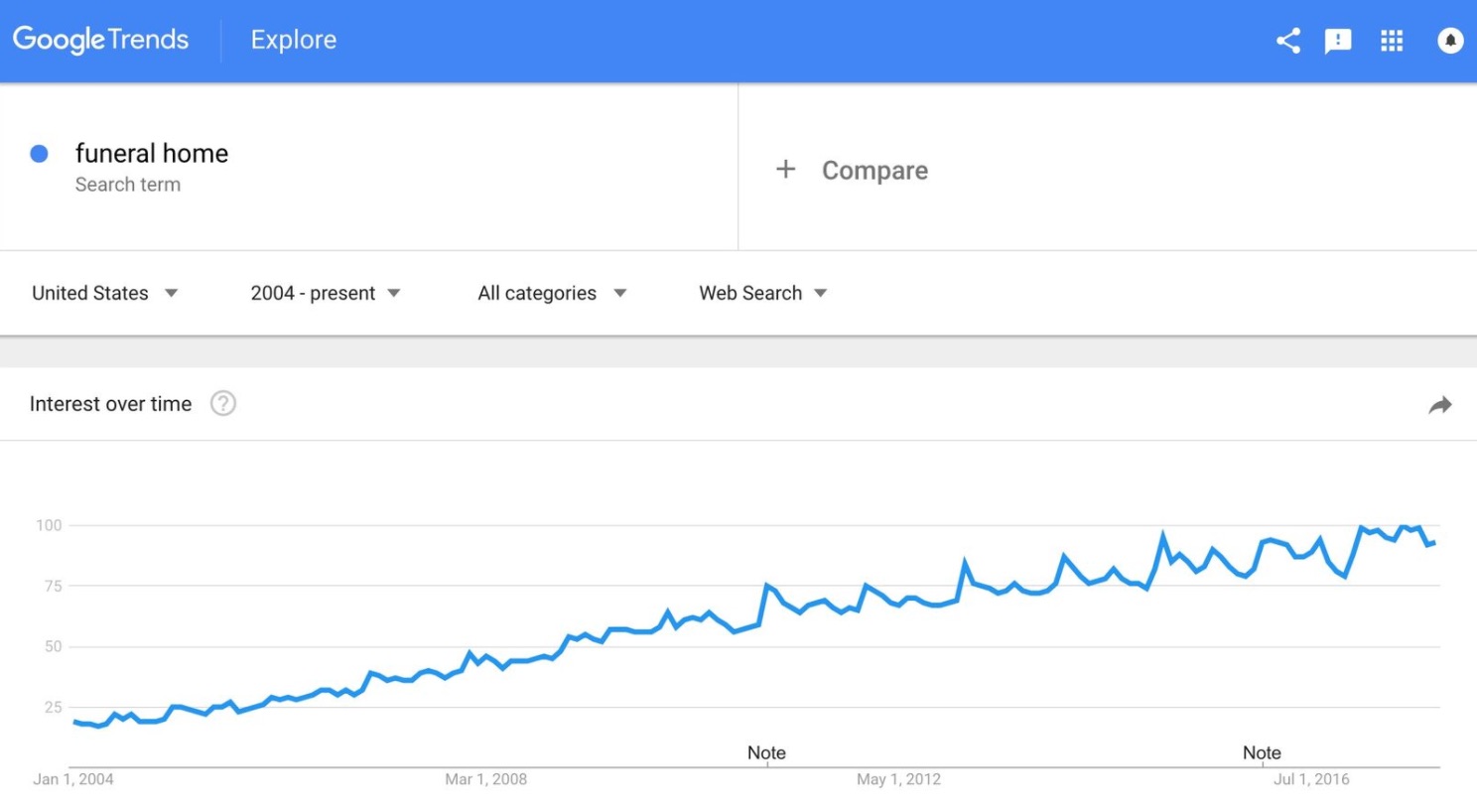
Google Searches on the term “funeral home” from 2004-2017
First Impressions Now Begin Online.
How the Internet Generation will change how you interact with potential customers.
Traditional funeral homes prided themselves in their ability to build trust. In-person, they knew how to make a great first impression and close the sale.
With the coming shift in consumer behavior, you no longer have the luxury of making your first impression in-person. The Internet Generation makes buying decisions based on information available online. They filter out a majority of their options before ever trying to talk to someone — picking up the phone and talking to a live person is the last resort. The average time someone spends on a webpage is fifteen seconds. So ensure they can collect the information necessary to choose your funeral home within that time. If not, they’ll discard your business as a potential option.
First impressions are now made online. Build trust by having a high-quality web presence that communicates transparency. Here are a few questions you’ll need answer with your web presence if you want to be considered as an option:
Are you trustworthy?
You should be easy to find with a simple online search. Your website should be high quality and modern. The photographs of your funeral home should be high resolution, well-lit, and beautiful. There should be plenty of people that have tried your services and given you great reviews.
Do the services you offer fit their requirements and needs?
You should explain the services you offer in a way so someone who has never arranged a funeral can understand. Communicate the value proposition of each of your services. You should state why someone should choose a service based on a need. Don’t list a menu of options filled with industry jargon. Be transparent about what your services cost.
What should your potential customers do next?
Your website visitors should be able to ask questions and get answers immediately without calling you. Your website should have obvious and clear next steps instructions. Instead of forcing your customers to fit into the way you want to do business, offer them the consumer options they prefer. You should have an online buying option if a customer does not want to see or talk to anyone.
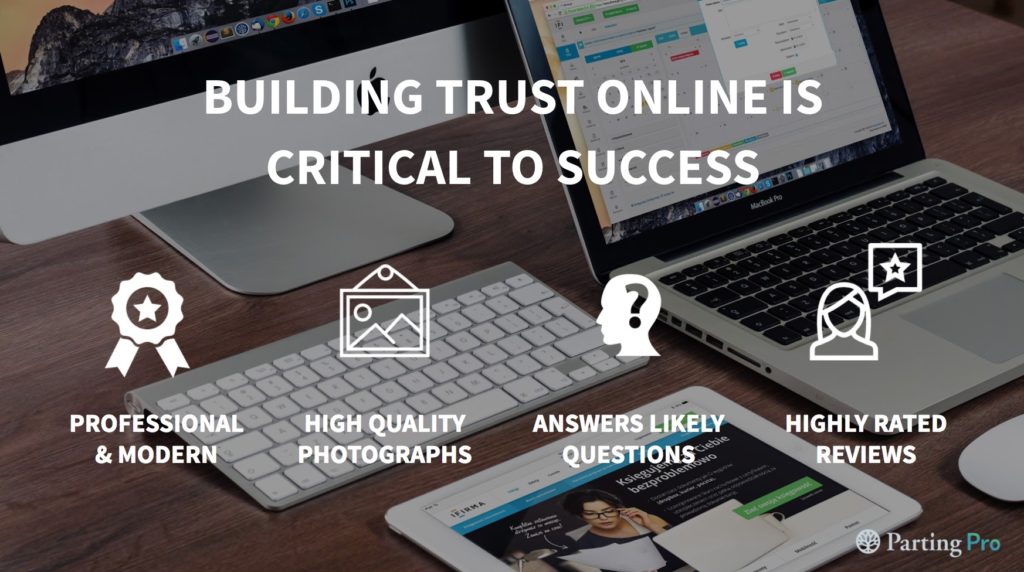
The Challenges and Opportunities of Rising Cremation Rates.
How the Internet Generation will change your service offerings.
In 2016, 50.2% of Americans chose cremation over burial. By 2035, NFDA projects the rate of cremation to reach 78.8%. Over the next eight years, cremation rates will likely exceed 50 percent in 44 states, up from 16 states in 2010.
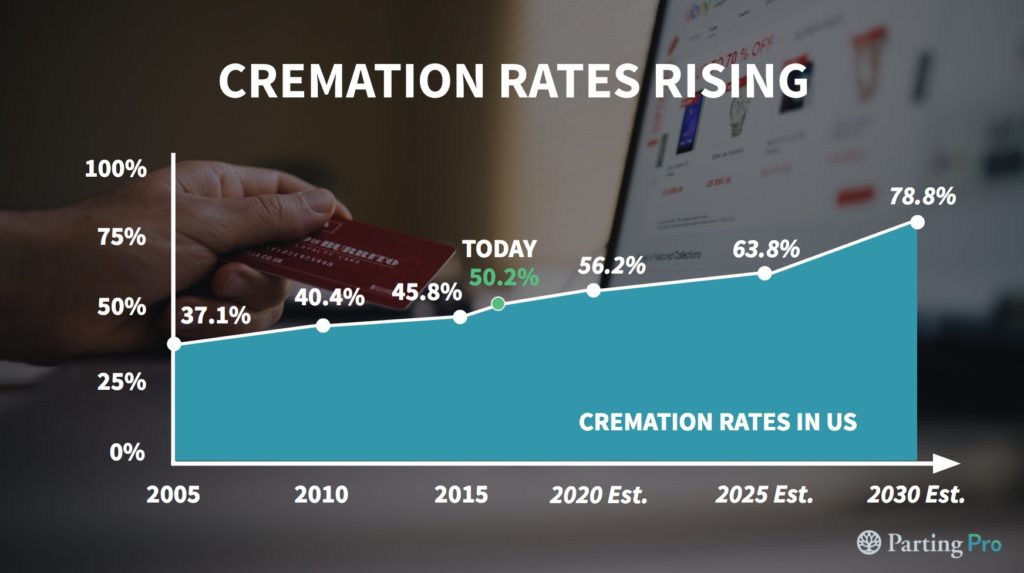
Communities that are embracing cremation have “roaming” tendencies. Attributes correlated with these communities include:
- Higher incomes
- Lower home ownership but higher home values
- Higher education levels
- More immigrant populations
These are urban, metropolitan areas that are very attractive to the Internet Generation.
For every industry the Internet Generation has forced themselves upon, they’ve faced the same challenges the funeral industry is going through today. Expectations of transparency and convenience pushed the commoditization of their industry’s products and services. Disposition is becoming a commodity in the eyes of the Internet Generation. Many of our funeral homes meet this challenge by offering a low cost direct cremation brand. This market will only grow.
Yet, the shift in consumer preferences also presents a massive opportunity. The wedding industry is a perfect example of these preferences. In a social media-driven world, the fundamental drivers for consumption change. Unique experiences that can build their personal online brand compel them to spend. Gone are the days where wedding planners could operate as wedding service providers with cookie-cutter packages. Internet Generation weddings have evolved into Instagram competitions. There’s an inherent need to one-up each other. Today’s wedding planners now work to ensure that every aspect of a wedding reflects the unique traits of the bride and groom. That every frame of the wedding is special, exclusive, and photogenic. From hipster food trucks, to punny wedding hashtags, to fanatical themes, to artisan snack bars — everything is deliberately constructed for the Instagram likes.
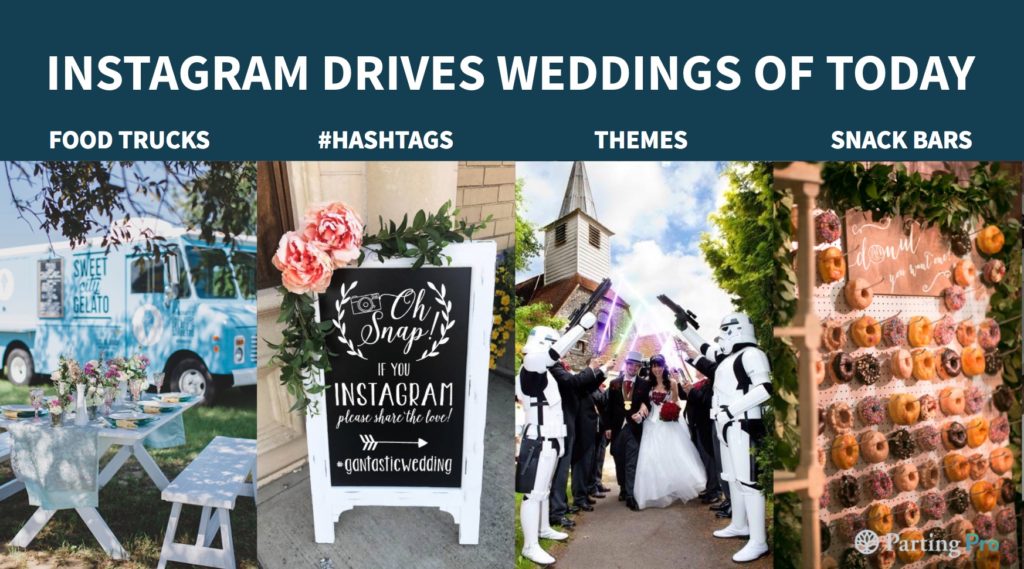
Like weddings, the Internet Generation doesn’t want cookie-cutter funeral services offered to everyone else. Instead, they would rather spend a fortune on unique celebration-of-life events. They want to show how special their loved ones were through the lens of social media.
Your funeral home must stop thinking of itself as a service provider. Instead, you are a consultant that delivers on tailored celebration-of-life experiences. The Internet Generation must think of you as an event planner who honors their loved one in the way that they need. They will take care of your marketing for you by sharing your events with everyone they know. Potential customers will find you through social media. If done right, the viral marketing cycle can repeat and fuel itself.
Operational Efficiency Means More Business.
How the Internet Generation will change the way you manage your operations.
When an industry shifts to digital marketing, how their businesses operate must also transform. Acquiring prime virtual real estate on Google, Facebook, and Yelp is a vicious competition. Online destinations monetize their users and maximize revenue by creating bidding wars between competing businesses. Those that can pay more get preferential treatment and receive more potential customers.
The transition to digital marketing gives businesses clarity into their entire operations. Businesses can now track how much each customer costs and where they come from. By focusing on converting a potential family to a happy customer more efficiently, businesses are spending less money on their operations. Since each customer now returns a higher profit, they can bid more to acquire a new one. They can outspend their unsophisticated competitors while still turning a healthy profit.
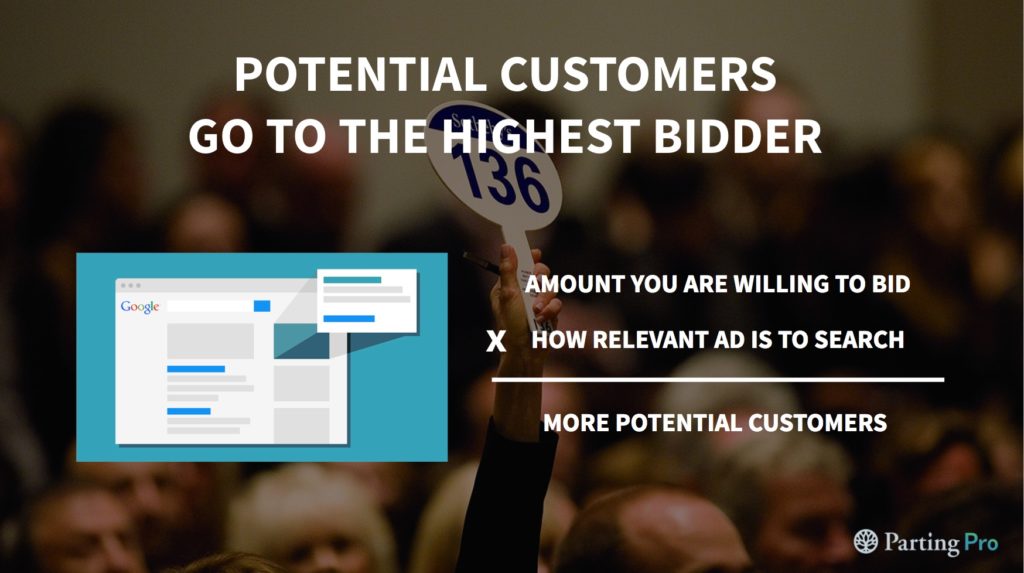
Businesses who don’t adapt cannot not stay profitable in the digital bidding war. Those that lack the profitability to compete in the new digital world are left behind.
Your funeral home must leverage technology to capitalize on the exciting opportunities ahead. Know where and how much you’re paying for each lead. Use software to track your conversion rates between each step to get to a happy customer. The faster you convert a lead into a paying customer, the more revenue you generate per lead. The more revenue you generate, the more you can spend on acquiring customers. In no time, you’ll fuel a growth machine that leaves your competitors in the dust.
If you can’t measure it, you can’t improve it.
Start measuring today to prepare for tomorrow.
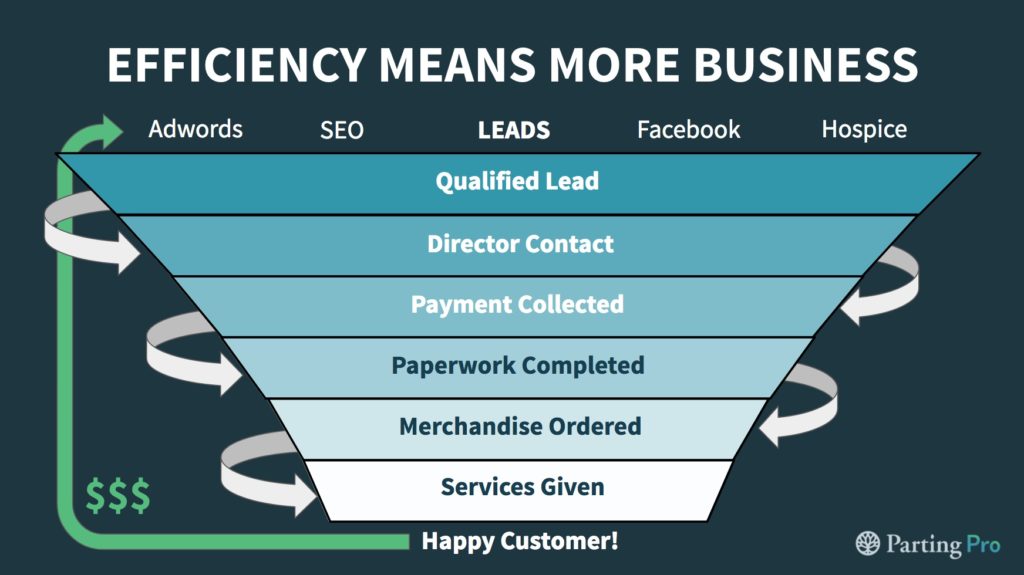
Will Chang is a cofounder of Parting Pro and Parting.com.




